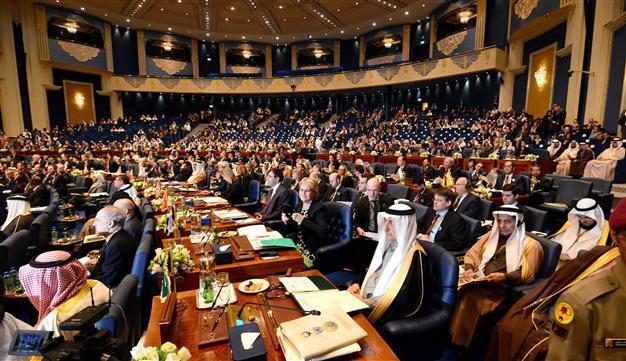Western, Arab states pledge $1.4 bln in fresh Syria aid
KUWAIT - Reuters

Delegates attend the opening session of the second International Humanitarian Pledging Conference for Syria pose for a group portrait at Bayan Palace, Kuwait City, on Wednesday, Jan 15, 2014. AP Photo
Western and Gulf Arab nations pledged $1.4 billion on Wednesday for United Nations aid efforts in Syria, where an almost three-year-old civil war has left millions of people hungry, ailing or displaced.
The pledge arose from an appeal for $6.5 billion launched last month that is the largest in U.N. history. The world body estimates that the conflict has reversed development gains in Syria by 35 years, with half its people now living in poverty.
But only 70 percent of $1.5 billion pledged at a similar meeting last year has reached U.N. coffers, hinting at donor fatigue with no end to the bloodshed on the horizon.
U.N. humanitarian chief Valerie Amos said all sides in the conflict had shown "total disregard for their responsibilities under international humanitarian and human rights law."
She decried the increasing tactic of siege warfare while U.N. Secretary-General Ban Ki-moon said polio had returned and he was "especially concerned" about reports of starvation.
"Children, women, men are trapped, hungry, ill, losing hope," Amos told an international donor conference in Kuwait intended to help the United Nations reach its $6.5 billion target for the crisis in 2014.
Kuwait's ruling emir, Sheikh Sabah al-Ahmed al-Sabah, promised $500 million in fresh assistance, while the United States announced a contribution of $380 million.
Qatar and Saudi Arabia pledged $60 million each. The European Union pledged $225 million and Britain $165 million.
The $1.5 billion promised via the United Nations at a similar meeting last year in Kuwait was used in Syria and surrounding countries to provide food rations, medicine, drinking water and shelters.
The largest donations at that conference came from Gulf Arab governments, who have backed Syrian rebels trying to oust President Bashar al-Assad.
"Even under the best circumstances, the fighting has set back Syria years, even decades," said Ban, who is chairing the Kuwait conference.
"I am especially concerned that the sides are using violence against women and girls to denigrate and dehumanise their opponents. I call for an immediate end to these abuses, which harm individuals and undermine Syria's future."
Ban has previously expressed regret that not all the promised donations have been received from the last meeting, with 20-30 percent still lacking.
Ban told the gathering on Wednesday he hoped peace talks due to start in Switzerland on Jan. 22 would bring the Syrian government and opposition to the negotiating table - although Assad's adversaries are deeply split over whether to attend.
"I hope this will launch a political process to establish a transitional governing body with a full executive powers, and most importantly, end the violence," he said.
Food rations for record 3.8 million people The World Food Programme (WFP) said on Tuesday it had delivered rations to a record 3.8 million people in Syria in December, but civilians in eastern provinces and besieged towns near the capital remain out of reach.
The U.N. agency voiced concern at reports of malnutrition in besieged areas, especially of children caught up in the fighting, and called for greater access.
Shooting forced the United Nations to abort a delivery of food and polio vaccines to one besieged district of Damascus after Syrian authorities said it should use a circuitous and dangerous route, a U.N. spokesman said on Wednesday.
Aid workers in Syria have accused authorities of hampering deliveries to opposition-controlled areas and threatening groups with expulsion if they try to avoid bureaucratic obstacles to help the tens of thousands trapped people. Damascus blames rebel attacks for aid delays.
The WFP says it needs to raise $35 million every week to meet the food needs of people both inside Syria and in neighbouring countries.
U.S. Secretary of State John Kerry said on Monday that Syria's government and some rebels might be willing to permit humanitarian aid to flow, enforce local ceasefires and take other confidence-building measures.
Kerry said he and Russian Foreign Minister Sergei Lavrov had mooted the possibility of trying to encourage a ceasefire, possibly beginning with Aleppo, Syria's largest city.
